CLASSIC QUOTES
Cherish the thought!
Who and What You Can Learn About on This Page
The Revd Walter Hilton
The Cloud of Unknowing
The Theologia Germanica
Dame Julian of Norwich
The Cloud of Unknowing
The Theologia Germanica
Dame Julian of Norwich
St Francis de Sales
The Revd Thomas Traherne
Madame Guyon
The Revd William Law
The Revd Thomas Traherne
Madame Guyon
The Revd William Law
Fr Jean Pierre de Caussade
St Thérèse of Lisieux
Fr Pierre Teilhard de Chardin
The Revd Dr Martin Israel
St Thérèse of Lisieux
Fr Pierre Teilhard de Chardin
The Revd Dr Martin Israel
They lived extra-ordinarily close to God and one might call them God's intimates. 'The mystics are men and women who insist that they know for certain the presence and activity of that which they call the Love of God', as Evelyn Underhill wrote.
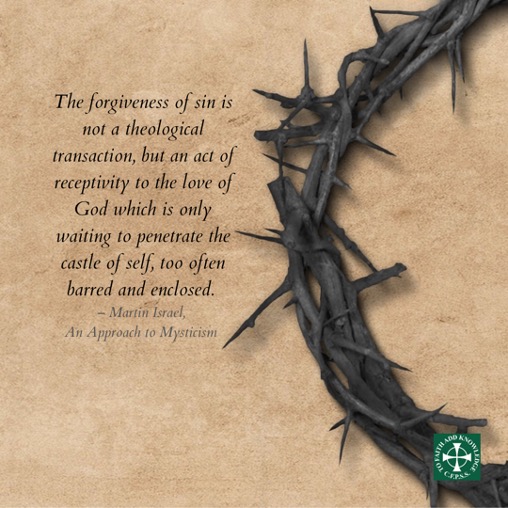
Move cursor over to enlarge
If you are new to the Christian mystical tradition, you may wish to start here:

The mystics tell us of the real and actual presence of God in and through all life. They tell us that life is a process of becoming: becoming more fully human and so more divine, more like Jesus, that this process is inexorable and ultimately unstoppable, that our part is always to choose to cooperate with God's will for us. His will is proclaimed to us through the events of our everyday life. Our struggles are of turning from hubris towards prayerful dependence upon supernatural love in our everyday circumstances.
These are, roughly, in chronological order with the most recent last. Each page has links from which you can download their work.
These are, roughly, in chronological order with the most recent last. Each page has links from which you can download their work.
The Revd Walter Hilton
▼
▲
Sayings from the Revd Canon Walter Hilton, an Augustinian monk
Walter Hilton was the first Englishman to write a book on the cure of souls, or, as we might say today, psyche-therapy. In his magnificent work The Ladder of Perfection he portrays the evolutionary nature of human redemption and the need to be reformed not only in our faith but also in our feelings. It is the strength of our feelings that is most likey to trip us up, to cause us to pain others.
Walter Hilton was born sometime between 1330 and 1343 AD. He died in Thurgarton, Nottinghamshire, on the Eve of the Feast of the Annunciation, on the 24th March, 1396. Ask of God nothing but this gift of love, which is the Holy Ghost. For there is no gift of God that is both the giver and the gift, but this gift of love.
Prayer is nothing else but an ascending or getting up of the desire of the heart into God, by withdrawing of it from all earthly thoughts.
There are two ways of knowing God—one chiefly by the imagination, the other by the understanding. The understanding is the mistress, and the imagination is the maid.
Your name Jesus is oil poured out for me; since by the effort of your gracious visiting I well feel the true interpretation of your name, you who are Jesus, Healing; for it is only your gracious presence that heals me from sorrow and from sin.
Downloads
Need a good place to begin study of Walter Hilton? View or download a copy of Neil's notes on the Revd Walter Hilton.The Ladder of Perfection
Treatise Written to a Devout Man
Below are pictures of the Priory Church of St Peter in Thurgarton, where Walter Hilton lived.
The photographs are displayed courtesy of the Southwell and Nottingham Church History Project (Pass the cursor over the photos to enlarge.)
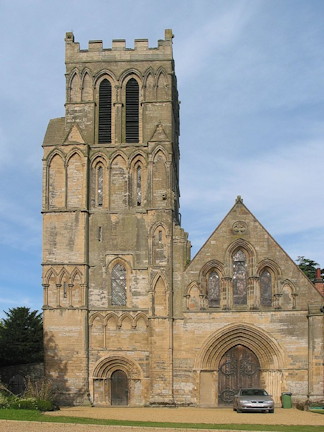
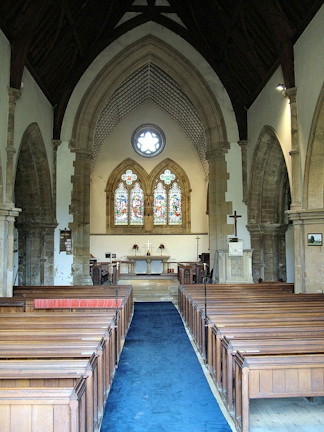
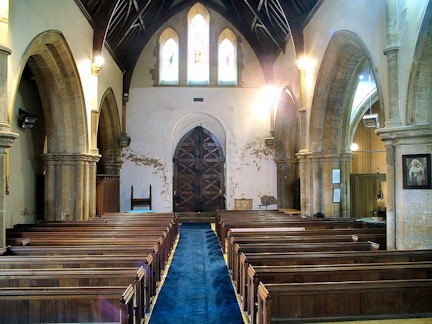



The Cloud of Unknowing
▼
▲
Sayings from The Cloud of Unknowing
The Cloud of Unknowing was probably written by a monk from a monastery in the East Midlands of England in the mid 14th Century. He describes how, for those who are called to this, one must leave the things of God behind in the quest for God himself.God can be taken and held by love but never by thought.
For if God is your love and your intent, the choice and the ground of your heart, this is enough for you in this life; even though you never see more of him with the eye of reason all your life long. Such a blind shot with the sharp arrow of a love that longs can never miss the bull’s-eye, which is God...Whenever reason falls short, then it is love’s pleasure to look alive and to learn to occupy itself. For by love we can find him, experience him, and reach him as he is in himself.
Lord, I want to follow this humble stirring of love which you put in my heart. For you will be my guide in this life and bring me to grace in the next. Your love in my heart is the substance of all good living; without your love no good work can be begun or ended. You direct my will to you and you give me satisfaction and gladness concerning all that I do.
Not what you are, nor what you have been, does God look upon with his merciful eyes, but what you would be.
GOD, unto whom all hearts be open, and unto whom all will speaketh, and unto whom no privy thing is hid. I beseech Thee so for to cleanse the intent of mine heart with the unspeakable gift of Thy grace, that I may perfectly love Thee, and worthily praise Thee. Amen.
(The above is the original form of the opening prayer in the Anglican Eucharistic rite.)
The two essential virtues are meekness and charity. He who might get these needeth no more for he hath all. Meekness is a true knowledge of ourselves as we are. He who knows himself truly knows God as far as that is possible in this life.
I beseech almighty God that true peace, sane counsel and spiritual comfort in God, with abundance of grace, be always with you and with all those on earth who love God.
Downloads
Neil's notes on The Cloud of Unknowing An introduction to this beautiful work on mystical prayer.The Cloud of Unknowing A translation.
The Theologia Germanica
▼
▲
Sayings from The Theologia Germanica
It was written around 1350, by a Teutonic knight of Frankfurt am Main who worked as a priest and warden. Luther had it printed in 1516, speculating that the author might be Johann Tauler. The Pope banned the book in 1612. This small volume describes sin in the simplest and clearest of words and shows what needs to be done about it.Sin is self-will.
Nothing burns in Hell but self-will.
As it is with the will, so it is with knowledge, reason, power, love, and everything that moves in man: It is all God’s domain, not man’s.
Sin is to assert self-will in independence of and against the eternal Will.
The more of the creature, the less of God.
In a divinized person the godly characteristic is humility deep in a person’s being. Where there is no humility we cannot speak of a divinized person. Christ taught this in words, works, and life.
The truly religious man is always more concerned about what God will do in him than what He will do to him; in his intense desire for the purification of his motives he almost wishes that heaven and hell were blotted out, that he might serve God for Himself alone.
Downloads
Neil's notes on The Theologia Germanica Download if you are starting from scratch.The Theologia Germanica A translation.
Dame Julian of Norwich
▼
▲
Quotes from the Lady Julian of Norwich, 1342 -1420?
(exact date unknown).There was a time in the 1980s when there was a revival of interest in the UK in Dame Julian's book. Rightly so, because until we have accepted the unchangeable fact that God not only created us, but loves us infinitely and is endlessly seeking to love the hell out of us, we will struggle to build in vain. God looks upon us 'with pity not with blame'.
He loves us and enjoys us, and so he wills that we love him and enjoy him, and firmly trust him; and all shall be well.
Our lover desires that our soul should cling to him with all its might, and that we should ever hold fast to his goodness. For this above all pleases God and strengthens the soul.
He is quick to clasp us to himself, for we are his joy and his delight, and he is our salvation and our life.
It is God’s will that we should rejoice with him in our salvation and that we should be cheered and strengthened by it.
As by his courtesy God forgives our sin when we repent, even so he wills that we should forgive our sin, and so give up our senseless worrying and faithless fear.
The testing experience of falling will lead us to a deep and wonderful knowledge of the constancy of God’s love, which neither can nor will be broken because of sin.
If we fall we are to get up quickly; for the worst pain a soul can have is to let sin take it away from God.
Our failings never hinder Him loving us.
It pleases God that by the help of his grace we should work away at our praying and our living, directing all our powers to him until in the fullness of joy we have him whom we seek - Jesus.
When a soul holds on to God in trust - whether in seeking him or contemplating him - this is the highest worship it can bring.
God, of your goodness, give yourself to me; for you are enough for me, and I can ask for nothing less than what fully honours you. And if I do ask anything less, then I will always be in want, for only in you do I have everything.
Downloads
If Christian mystical thinking is new to you, download a copy of Neil's notes on Dame Julian of Norwich.Revelations of Divine Love
Below are pictures of St Julian's church in Norwich.
(Pass the cursor over the photos to enlarge.)


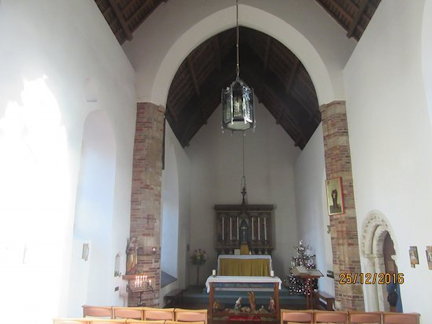
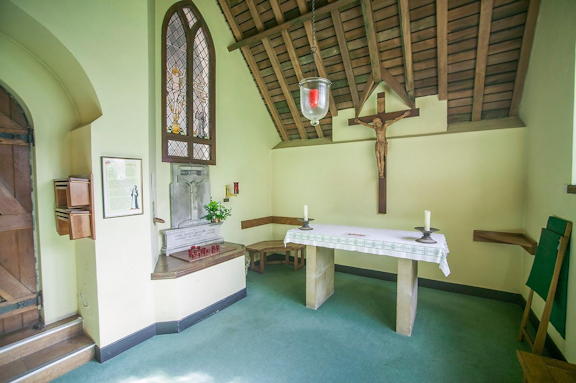
Dame Julian's cell
St Francis de Sales
▼
▲
Quotes from St Francis de Sales, a French Bishop (1567-1622).
St Francis de Sales's writings must be amongst the most heart-warming words on spiritual growth ever written. They are easy to understand and are always full of encouragement.Be patient with everyone, but above all be patient with yourself. I mean, do not be disheartened by your imperfections, but instantly set about remedying them - every day begin the task anew.
We must begin from within. ‘Turn to me with your whole heart’ is God’s call. ‘My son, give me your heart.’ For the heart is the mainspring of our actions. So our Lord says: ‘Set me a seal upon your heart and a seal upon your arm’, for whoever truly has Jesus Christ in his heart will soon show it in all his outward actions.
Our words are a faithful index of the state of our souls.
There was never an angry man that thought his anger unjust.
We must never so form our opinions as not to be ready if necessary to give them up.
He who stays not in his littleness, loses his greatness.
Do not look forward to the changes and chances of this life in fear; rather look to them with hope that, as they arise, God, whose you are, will deliver you out of them. He has kept you hitherto - do you but hold fast to his dear hand and he will lead you safely through all things; and when you cannot stand, he will bear you in his arms.
What do you think the bed of tribulation is? It is simply the school of humility.
Do not look forward to what might happen tomorrow; the same Everlasting Father who cares for you today, will take care of you tomorrow and every day. Either He will shield you from suffering or He will give you unfailing strength to bear it. Be at peace then, and put aside all anxious thoughts and imagingings.
Make sickness itself a prayer.
Look at the bees upon the thyme; they find there a very bitter juice but in sucking it they turn it into honey.
Love is the abridgement of all theology.
Compassion is to devotion what the fire is to the flame, for compassion is a spiritual fire, which is called devotion when it breaks into flame.
Devotion is nothing else but that spiritual alertness and vivacity which enables us to cooperate with compassion promptly and wholeheartedly.
Prayer is the outflowing of the soul into her God and transcends the limits of the natural way.
Make a daily new beginning; there is no better means of progress in the spiritual life than to be continually beginning afresh, and never to think that we have done enough.
Downloads
Novice? Then download a copy of Neil's notes on St Francis de Sales.Introduction to the Devout Life
Treatise on the Love of God
The Revd Thomas Traherne
▼
▲
Quotes from the Revd Thomas Traherne, an English priest and mystic (1637-1674)
Thomas Traherne was an English metaphysical poet and a nature-mystic. He celebrated the glories of God's creation, revealing some beauties of the interior life. The Church of England celebrates his life and work on October 10th.
O give yourself unto me, for without you no gift at all can satisfy. And because you yourself are the gift, O give me what you are, that I may give you what I am, and be made a partaker of the divine nature.
Blessed be thy holy Name, O Lord, my God! For ever blessed be thy holy Name, For that I am made the work of thy hands, Curiously wrought by thy Divine Wisdom, Enriched by thy Goodness, Being more thine than I am mine own. O Lord!
Love proceeds of necessity from itself, for unless it be of itself it is not love. The love from which it flows is the fountain of love; the love which streams from it is the communication of love, or love communicated, and the love which rests in the object is the love which streams to it. So that in all love the Trinity is clear.
When we dote upon the perfections and beauties of some one creature, we do not love that too much, but other things too little. Never was any thing in this world loved too much, but many things have been loved in a false way, and all in too short a measure.
You never enjoy the world aright, till the Sea itself flows in your veins, till you are clothed with the heavens, and crowned with the stars: and perceive yourself to be the sole heir of the whole world, and more than so, because men are in it who are every one sole heirs as well as you.
I too am visited by angels and demons, but I get rid of them. When it is an angel I pray an old prayer, and he is bored. When it is a devil I commit an old sin, and he passes me by.
Downloads
Just starting to discover the Christian mystics? Then download a copy of Neil's notes on the Revd Thomas TraherneCenturies of Meditation
Madame Guyon
▼
▲
Quotes from Madame Jeanne-Marie Bouvier de la Motte-Guyon, (1648 - 1717).
Her brief book on prayer has been hailed as one of the most influential Christian books ever written by a woman and its influence on France, and especially on Louis XIV’s reign, is undisputed. The title is very helpful when it is taken with its original sub-title: ‘A Short and Easy Method of Prayer, which all can practise with the greatest facility, and arrive in a short time, by its means, at a high degree of perfection’. This book has been greatly treasured and very highly recommended by numerous Christian leaders. John Wesley, Count Zinzendorf, Hudson Taylor, Charles Spurgeon and Watchman Nee were among its supporters because it introduces the reader to a deeper experience and fuller relationship with Jesus Christ.
The love of God encompasses everything within itself and everything that is rooted in love stems from God.
To seek after God in the right way is easier and more natural than breathing.
God, is only to be found in our inner selves, which is the holy of holies where God dwells.
Prayer is the application of the heart to God, and the internal exercise of love... To attract and draw the soul into the rest of love, and not into the many ways of the self.
All who desire to pray may pray without difficulty as they are strengthened by those universal graces and gifts of the Holy Spirit which all men and women possess.
Prayer is the guide to perfection, and prayer delivers us from every vice, and gives us every virtue; for the one way to become perfect is to walk in the presence of God.
Prayer from the heart is not interrupted by the thoughts from a person’s mind. Indeed nothing can interrupt this prayer except for ungodly inclinations.
Salvation consists in a total change of the whole person as he turns from his outer life to his inner life.
As soon as you come in the presence of God, remain in respectful silence for a little while.... Simply Enjoy God.
Downloads
Neil's notes on Madame Guyon, Newcomer to the mystical tradition of Christianity? Then download these notes.A Short and Very Easy Method of Prayer
The Autobiography of Madame Guyon
Here are some of her poems in English
The Revd William Law
▼
▲
Quotes from the Revd William Law,
Law was an English priest and one of the greatest Christian mystics this country has produced (1686-1761).Life is God living and working in the soul.
It is much more possible for the sun to give out darkness than for God to do or be, or give out anything but blessing and goodness.
There is but one salvation for all mankind, and that is the life of God in the soul. God has but one design or intent towards all mankind, and that is to introduce or generate his own life, light and spirit in them, that all may be as so many images, temples, and habitations of the holy Trinity. This is God’s will to all Christians, Jews and heathens. They are all equally the desire of his heart. Now there is but one possible way for man to attain this salvation. There is not one way for a Jew, another for a Christian and a third for a heathen. No; God is one, human nature is one, salvation is one, and the way to it is one; and that is the desire of the soul turned to God.
All our salvation consists in the manifestation of the nature, life and spirit of Jesus Christ in our inward new man. This alone is Christian redemption, this alone delivers from the guilt and power of sin, this alone redeems and renews.
For the sun meets not the springing bud that stretches towards him with half that certainty as God, the source of all good, communicates himself to the soul that longs to partake of him.
No one can fail of the benefit of Christ's salvation but through an unwillingness to have it. The great work is already in every one of us.
True faith is coming to Jesus Christ to be saved and delivered from a sinful nature, as the Canaanite woman came to Him and would not be denied.
I know of no hell, either here or hereafter, but the power and working of wrath, nor any heaven but where the God of Love is all in all, and the working Life of all.
Would you know who is the greatest saint in the world: It is not he who prays most or fasts most, it is not he who gives most alms or is most eminent for temperance, chastity or justice; but it is he who is always thankful to God, who wills everything that God wills, who receives everything as an instance of God’s goodness and has a heart always ready to praise God for it.
There is nothing that makes us love a man so much as praying for him.
Downloads
Neil's notes on the Revd William Law. Know very little about England's finest Christian mystic? Then download these notes.The Devout Life: William Law's Understanding of Divine Love.
Later works of the Revd William Law The clarity of The Spirit of Prayer and The Spirit of Love inspires worship.
Revd William Law's tombstone
Collect for William Law's Day, April 10th.
Photos of Law's birthplace, church etc.
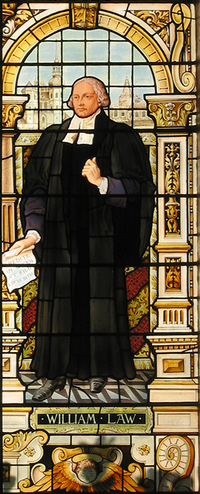 William Law stained glass window in the chapel of Emmanuel College, Cambridge.
William Law stained glass window in the chapel of Emmanuel College, Cambridge.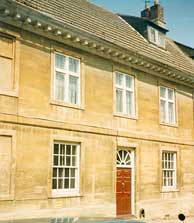
William Law was born in this house [Photographer: Neil]
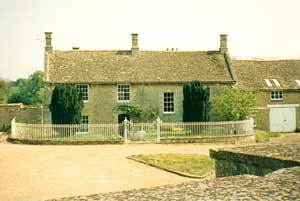
William Law lived here for most of his life. This photo is taken from his tombstone. [Photographer: Neil]
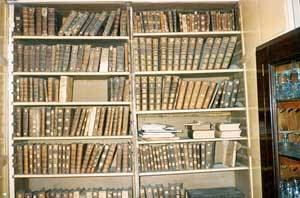
A close up view of Law's personal library. [Photographer: Neil]

This is part of William Law's private library. It includes his own copies of Jacob Boehme's books. [Photographer: Neil]
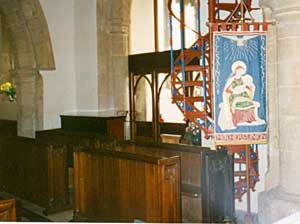
This is William Law's stall in the parish church. He worshipped here daily whilst banned from ever preaching or celebrating the sacraments. [Photographer: Neil]
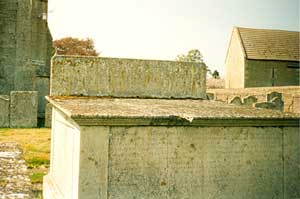
William Law is buried in this triple sized tomb directly opposite his home. [Photographer: Neil]
Fr Jean Pierre de Caussade
▼
▲
Quotes from Fr Jean Pierre de Caussade,
a French Jesuit Priest (7 March 1675 – 8 December 1751).We only know perfectly what experience has taught us through suffering and action. Experience is the school of the Holy Spirit who speaks to the heart words of life, and all that we say to others should come from this source.
The doctrine of pure love can only be learnt by God’s action, not by any effort of our own spirit.
God instructs the heart not by means of ideas, but by pains and contradictions.
It is by union with his will that one enjoys and possesses God, and it is an illusion to seek for that enjoyment by any other means. The will of God is the universal means. This means does not belong to this or that method, but it has the virtue of sanctifying all methods and special calls.
The past must be left to God’s measureless mercy, the future to his loving providence; and the present must be given wholly to his love through our fidelity to his grace.
Let us understand clearly that we shall not acquire true conformity to the will of God until we are perfectly resolved to serve him according to his will and pleasure, and not according to our own.
I recommend the book: Self-Abandonment to Divine Providence as published by Tan Books in the USA in 1987. ISBN: 0-89555-312-0. This is the most complete, recent text of his collected writings I know of.
Downloads
Neil's notes on Fr Jean Pierre de Caussade Fresh to Christian mysticism? Then download these notes.Self-Abandonment to Divine Providence
St Thérèse of Lisieux
▼
▲
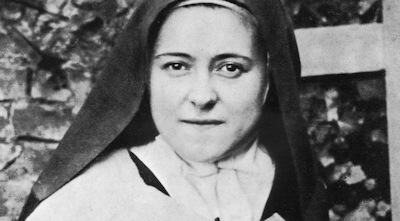
Quotes from St Thérèse of Lisieux.
I have noticed that experience of suffering makes us kind and indulgent towards others, because it is suffering that draws us nearer to God. Let us not believe we can love without suffering. It suffices that we truly will all that God wills...If I did not suffer from one minute to the next, I should find it impossible to maintain my patience, but I do not look farther than the present moment. It is because one thinks of the past and the future that one becomes discouraged and loses hope.Prayer for me is simply a raising of the heart, a simple glance towards Heaven, an expression of love and gratitude in the midst of trial as well as in times of joy; in a word, it is something noble and supernatural expanding my soul and uniting it to God... I take refuge in prayer and sacrifice. They are my invincible arms, and I know from experience that I can conquer hearts with these more surely than I can with words.
We can never have too much confidence in our God who is so mighty and merciful; as we hope in Him so shall we receive. It is gratitude that brings us the most grace.
Perfection consists in doing His will, in being that which He wants us to be.
O my God, you see how easily I lose heart at the thought of my imperfections. Nevertheless, I shall continue to strive for virtue. Gladly will I forego all consolation in order to offer you the fruit of my efforts. I wish to make profit out of the smallest actions and to do them for love.
Deepen your love in me, O Lord, that I may learn in my inmost heart how sweet it is to love, to be dissolved, and to plunge myself into your love. Let your love possess and raise me above myself, with a fervour and wonder beyond imagination. Let me sing the song of love. Let me follow you into the heights. Let my soul spend itself in your praise, rejoicing for love. Let me love you more than myself, and myself only for your sake. let me love others, as your law commands.
Holiness is not in one exercise or another; it consists in a disposition of the heart which renders us humble and little in the hands of God, conscious of our weakness, and confident, even daringly confident, of His paternal goodness.
God knows your intentions. As long as you are humble you will be happy.
Why should I desire that the good God make use of me rather than another? Provided that His reign be established in souls, the instrument matters little!
I have never given God anything but love. Love is the only thing that matters. No, I did not fight hard. I loved, loved deeply.
I shall spend my Heaven doing good on earth. After my death I will let fall a shower of roses.
Downloads
Autobiography of a Saint Want to know more about one of the greatest Doctors of the Church? Then download a copy of her autobiography.Poems
Fr Pierre Teilhard de Chardin
▼
▲
Quotes from Fr Pierre Teilhard de Chardin, mystic, priest and paleontologist.
(1st May 1881-10th April 1955).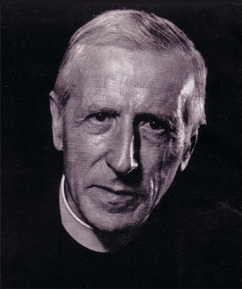
Love is the affinity which links and draws together the elements of the world... Love, in fact, is the agent of universal synthesis. Activation of Energy.
Love alone is capable of uniting living beings in such a way as to complete and fulfil them, for it alone takes them and joins them by what is deepest in themselves. All we need is to imagine our ability to love developing until it embraces the totality of men and the earth.
It is our duty as men and women to proceed as though the limits of our abilities do not exist. We are collaborators in creation.
We are one, after all, you and I. Together we suffer, together exist, and forever will recreate each other.
The world is round so that friendship may encircle it.
The most satisfying thing in life is to have been able to give a large part of one's self to others.
At a certain time in your life you realize that you have only two choices: genuflect before something greater than yourself or begin to self-destruct.
It is the whole of my being, Lord Christ, that you would have me give you, tree and fruit alike, the finished work as well as the harnessed power, the opus together with the operation.
Lord, enfold me in the depths of your heart; and there hold me, refine, purge, and set me on fire, raise me aloft, until my own self knows utter annihilation.
Lord Christ, you who are as gentle as the human heart, as fiery as the forces of nature, as intimate as life itself, you in whom I can melt away and with whom I have mastery and freedom: I love you as a world, as this world which has captivated my heart. It is you, I now realize, that my brother-men, even those who do not believe, sense and seek throughout the magic immensities of the cosmos.
To adore; that means to lose oneself in the unfathomable, to plunge into the inexhaustible, to find peace in the incorruptible, to be absorbed in undefined immensity, to offer oneself to the fire of transparency, to annihilate oneself in proportion as one becomes more deliberately conscious of oneself, and to give of ones deepest to that, whose depth has no end.
Everything that rises must converge.
I believe that the universe is an evolution. I believe that evolution proceeds toward spirit. I believe that, in man, spirit is fully realized in person. I believe that the supremely personal is the universal Christ.
Our faith imposes on us a right and duty to throw ourselves into the things of the earth.
One sees that Christianity can only survive and triumph when, through its vision of things, it shows itself capable of activating to the maximum degree, Man's energy of "self-evolution". In other words, if the Church is to succeed in the eyes of Man, not only must it "amorize" the World (i.e., teach it to love) more than any religion does, it must also "valorize" it (i.e., teach it to know its own worth).
Someday, after mastering the winds, the waves, the tides and gravity, we shall harness for God the energies of love, and then, for a second time in the history of the world, man will have discovered fire.
In order to keep within copyright laws, I have greatly abridged a most powerful essay of Teilhard's. The original is titled "The Meaning and Constructive Value of Suffering". If you wish, please download the shorter version: Meaning and Constructive Value of Suffering. If you wish to read the full version, you may find it, translated by Noel Lindsay, on pp.23-6 of Teilhard de Chardin: Pilgrim of the Future published in 1965 by DLT as a Libra book. Or in Elizabeth Basset's anthology Love is my Meaning on pp.127-130.
"...the supremely unifying amputations of suffering..." This phrase is used by Teilhard in a letter to Fr. Auguste Valensin in a letter dated 12th December, 1919 in Paris.
In the final analysis, the questions of why bad things happen to good people transmutes itself into some very different questions, no longer asking why something happened, but asking how we will respond, what we intend to do now that it has happened.
If you enjoy Teilhard’s approach, you may also wish to explore the writings of Louis M Savary and/or Louis M Savary and Patricia H Berne who both have written exercise-based books to help today’s readers explore the Teilhardian understanding of life. The American scientist and Franciscan nun Ilia Delio has written books and put up You-tube videos which continue the Teilhardian explorations in the twenty-first century.
Downloads
Hymn of the Universe. Want to get started on a mystic for the 21st Century? Download the text of Teilhard's Hymn of the Universe. It is an edited collection of 'the Best of Teilhard's writings'.On Love and Happiness Wanting bite-sized morsels of a modern mystic? Download this text.
The Slow Work of God Wanting Teilhard's advice on our spiritual growth? Download a copy.
Teilhard's vision. Wanting to read one of Teilhard's mystical visions? Download a copy. This vision is found in his essay ‘Christ in the World of Matter’ on pp.42-3 of Hymn of the Universe.
Nostalgia for the Front
The three books of his Christian mystical writings, in the order that they were written, are Writings in Time of War, The Divine Milieu and The Heart of Matter. The finest edition of The Divine Milieu is that by Siôn Cowell. It is published by Sussex Academic Press. The ISBN is 1-903900-58-1.
The following can also be downloaded:
Human Energy
Hymn of the Universe
Let Me Explain
Letters from a Traveller
Letters to Leontine Zanta
Letters to Lucile Swan
Hymn of the Universe
Let Me Explain
Letters from a Traveller
Letters to Leontine Zanta
Letters to Lucile Swan
Letters to Two Friends
Man's Place in Nature
On Love and Happiness
Science and Christ
The Appearance of Man
Man's Place in Nature
On Love and Happiness
Science and Christ
The Appearance of Man
The Future of Man
The Making of a Mind
The Phenomenon of Man
The Vision of the Past
Toward the Future
The Making of a Mind
The Phenomenon of Man
The Vision of the Past
Toward the Future
Photos of Teilhard de Chardin's church in Hastings
These photos show the plaque to Teilhard erected on the site of his theological college at Ore Place, off Elphinstone Road, on the northern edge of Hastings. [Photographer: Neil], and Teilhard's church, St Mary Star of the Sea, on the eastern side of Hastings, off the A259 coastal road. The views inside the church shows the high altar where Teilhard celebrated his first Mass on 25th August 1911.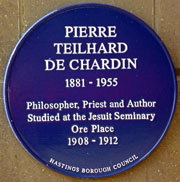
Move cursor over photos to enlarge
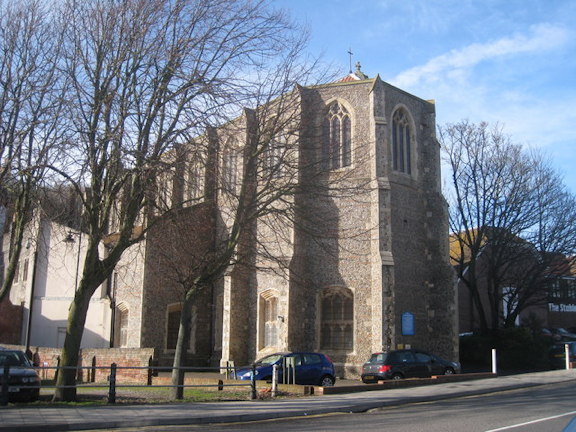
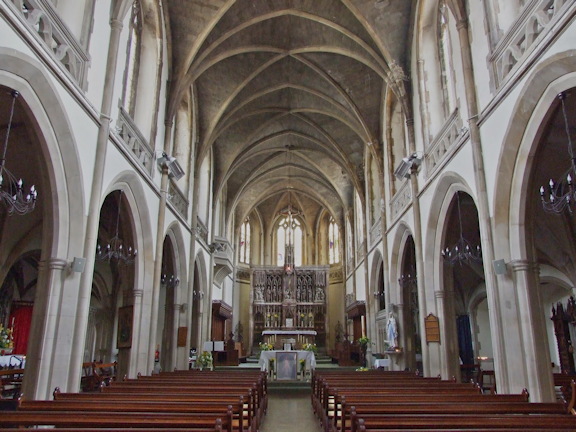
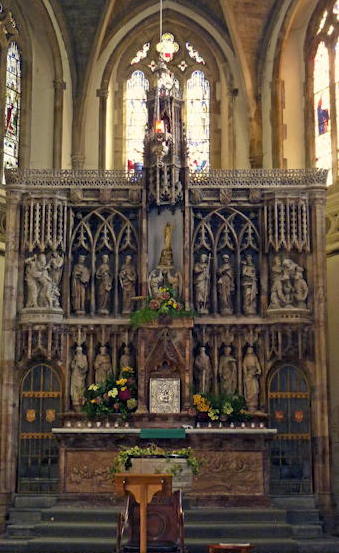
The Revd Dr Martin Israel
▼
▲
Quotes from Revd Dr Martin Israel, mystic, priest and pathologist.
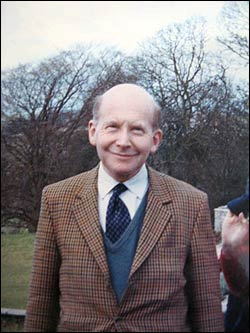
If I personally were asked by an interested, but totally uncommitted, observer what I meant by the word God, I would say 'a presence of spiritual aspiration beyond myself by which my life is guided towards the light.' Any more positive definition confuses the divine mystery in a mass of human reasoning and verbiage. The light towards which God guides me is embraced in the three ultimate values: beauty, truth and goodness, as declared by Plato. The Christian would prefer to substitute the quality of love for goodness, but the intention is the same; a mode of self-transcendence in which we are part of the vast body of creation in a glory that both obliterates the little ego and brings the full person into unique actualization as a servant of love for the whole community. Life Eternal p.52
'If I can forget even for a moment all the injuries that have been done to me, and all the unpleasant things people have said about me, and all my fears and worries about the future, if I can start to forgive all those in my life who have betrayed and injured me — always bearing in mind the injury I have done to others — I repeat, if all this incubus of resentment, fear, and hatred which is part of the human condition and is what we call the hell in our existence, can be relieved and cleansed through the power of love, I can suddenly begin to live properly and realise that I am not really alone at all. I will see that both my misery and my hope are part of the universal scheme of becoming, and that I can only begin to be a proper person when I am no longer enclosed in myself. Then I will know that I am part of a greater whole which is the psychic component of all created things.
At that point, a new awareness comes into me and I begin to understand the meaning of forgiveness. When I am unforgiven— and this was the state of man before the Resurrection — I am enclosed and alone, full of fear, self-justification, and many other fruitless, destructive emotional attitudes. But once this enclosedness is penetrated through love that comes to me, not because I deserve it, but because I am a creature of God, an opening occurs in my defences so that this love can enter me and healing can come to me. This is precisely how people are made whole in Christ. I repeat, once this protective separateness in me is rent asunder by love and I am no longer frightened and resentful, the power of God can come to me and I can begin to realise the Christ within me.' Christ, Son of God p.10
If we pledge ourselves to the preservation of life and the fostering of goodwill among people, we will be open to the healing power of God. Prayer and Healing.
Healing is not a plastering over of a defective personality, bought to notice by a physical or mental disorder, but a renewal of the whole person in the light of truth.
John the Baptist makes us aware of what we are, and then Jesus accepts us for what we are. He gives up his life for us. He becomes sin for us so that, as St Paul puts it, a new dimension of reality may come. Discipleship Today.
It was the Church of His time that conspired to crucify Jesus, not the common people around Him, who were weak rather than evil. And yet we are not to indulge our weaknesses or those of other people. They are to be confronted, seen for what they are, and given to God in humble confession so that they may be healed. This is love in action; it is not simply a benevolent attitude but a way of life that works towards the healing of all things in God. Love is warm, but it has its chill also — for it demands everything we possess. Love endures all things, but it also works with impatience for the resurrection of folly to wisdom, for the maturing of selfish attitudes of juvenility to the self-giving sacrifice that crowns a life of creative experience.
Self-love is no static ecstasy of self-approval. It is simply the first essential stage in an arduous re-creation of the personality into something of the fullness of the stature of Christ. In the same way, only when we love the perversity that lies at the heart of another person’s soul, can we effect a relationship with him. But the end of that relationship is a regeneration of that individual into a real person, one who has an alert, functioning will capable of choice, decision and action. Only when we have come to terms with the perversity within ourselves can we start to relate in earnest with the other person.
To be aware of the heavenly realm, to which death is the portal of entry,we do not have so much to think about spiritual things as to be fully aware of the present moment. Life Eternal p.6.
To buy Dr Israel's booklets, tapes, cds, books go to The Churches Fellowship for Psychical and Spiritual Studies.
Downloads
▼
▲
Healing as Sacrament
Living Alone
Martin on Julian of Norwich
Night Thoughts
Praying with God
Precarious Living
Living Alone
Martin on Julian of Norwich
Night Thoughts
Praying with God
Precarious Living
